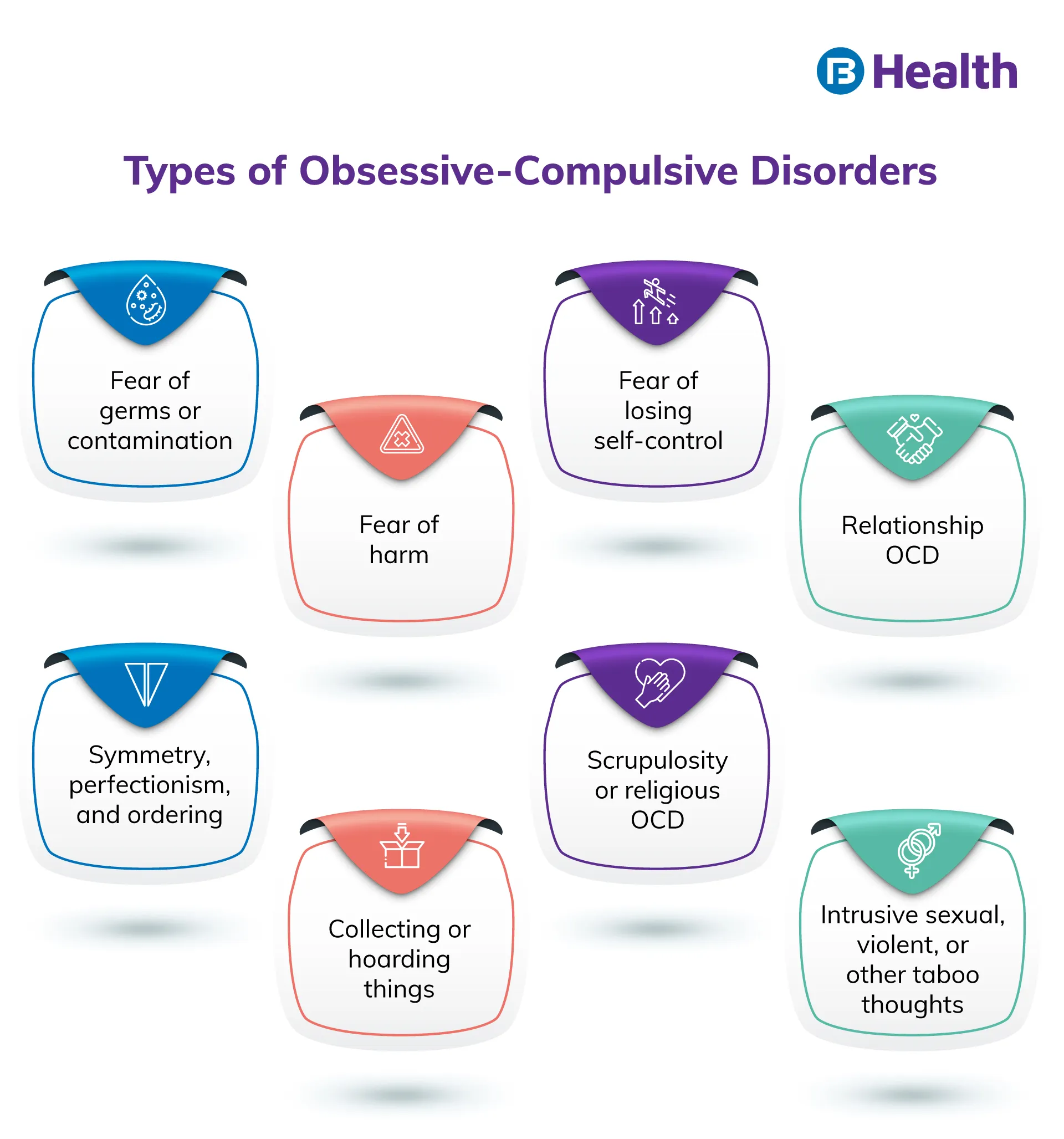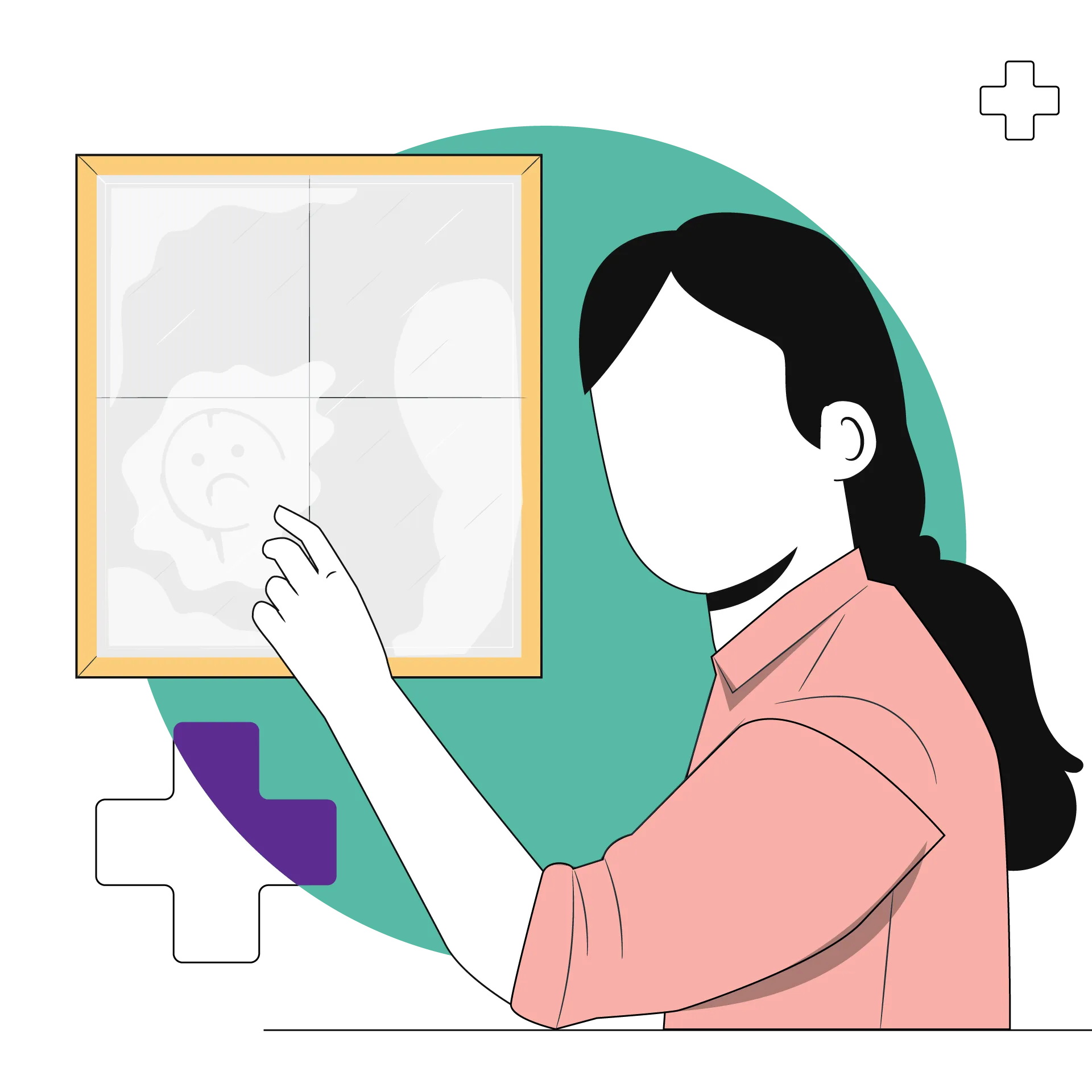Psychiatrist | 7 min read
Obsessive-Compulsive Disorder: Causes, Complications, Risk Factor
Medically reviewed by
Table of Content
Key Takeaways
- Compulsive disorders are categorized by unwanted recurring thoughts
- Failed relationships and poor quality of life are some OCD complications
- Excessive cleaning or washing hands is a symptom of compulsive disorder
Obsessive-compulsive disorder is a chronic and long-lasting mental health disorder. People with OCD disorder have unwanted, uncontrollable and recurring thoughts and sensations. This disorder makes a person repeat something over and over.
Obsession includes unwanted thoughts or urges that cause distress. People suffering from compulsive behavior disorder try to get rid of their obsession by engaging in repetitive behaviors. An obsessive-compulsive disorder occurs when you get caught in the cycle of obsession and compulsion.
This type of mental disorder affects people of all ages and walks of life [1]. In fact, 2-3% of the general population experience compulsive disorders or OCD in their lifetime [2]. Compulsive thoughts and behaviors like cleaning or checking things frequently can significantly impact your daily routine and social life. Get the right care for mental health by reading this guide on obsessive-compulsive disorder.
Additional Read: Bipolar Disorder TypesObsessive-Compulsive Disorder Types
An obsessive-compulsive disorder appears in many forms. But, mainly, it is classified into four types:
Checking
People with this type of OCD often feel a lack of confidence in their ability and & judgment. They have the feeling of causing harm because of their carelessness. They constantly struggle with the thought of being irresponsible and careless and things being messed up. They might tend to check things multiple times to ensure the task has been completed correctly. Their compulsions include checking stoves, wallets, and locks to ensure everything is safe.
Contamination
This type of OCD revolves around the two ideologies that words and thoughts can contaminate a person and, secondly, fear of spreading illness through touch. People suffering from this type of OCD often wash their hands and keep their environment and items clean to avoid contamination. Many times due to fear of being sick and& spreading germs, they avoid certain objects, places, and people.
Symmetry and Ordering
The person suffering from this type of OCD is obsessed with things being a certain way. It is not some regular type of arrangement; people can spend hours arranging the same objects to meet a certain standard. As a result, they may become distressed or develop a fear of harm until things are organized.
Ruminations and Intrusive Thoughts
People dealing with this type of OCD get stuck on topics like philosophy and religion; usually, this kind of topic doesn’t have any proven answers. Since this question has no answer, the person might feel upset and dissatisfied after thinking for a long time.

OCD (Obsessive-Compulsive Disorder) Symptoms
People with OCD disorder may have symptoms of obsessions or compulsions or both.
- Obsessive symptoms
These are thoughts or images that cause anxiety and make you engage in compulsive behavior. Here are some types of obsessions:
- Fear of dirt, germs, and contamination by touching objects or surfaces touched by others
- Stress when things are not in perfect or symmetrical order
- Aggressive or horrific thoughts involving yourself and others
- Forbidden or unwanted thoughts about aggression, sex, or religion
- Difficulty in tolerating uncertainty such as doubts about locking the door
- Thoughts of acting inappropriately in public
- Compulsive symptoms
Here are some examples:
- Excessive cleaning or washing of hands
- Arranging things in a particular way
- Counting repeatedly or in certain patterns
- Frequently seeking reassurance from others
- Repeating a word, phrase or prayer silently
- Touching an object for a set number of times
- Buying the same items several times or collecting certain objects
- Hiding objects that could be used to hurt someone or yourself
- Checking things repeatedly such as frequently seeing if the door is locked
OCD (Obsessive-Compulsive Disorder) Causes
Although the causes of OCD disorder are unknown, here are some risk factors that may contribute to developing an obsessive-compulsive disorder.
Genetics
Having a first-degree relative such as a parent, sibling, or child who has OCD increases your risk of developing the same.
Brain structure and functioning
A difference in brain structure is observed in patients with OCD. This may be a possible cause [3].
Environment
Many factors such as childhood trauma, stress, abuse, brain injury, and certain personality traits can increase the risk of OCD disorder.
OCD (Obsessive-Compulsive Disorder) Complications
Obsessive-compulsive disorder can lead to certain complications such as:
- Relationship troubles
- Poor quality of life
- Suicidal thoughts and behavior
- Spending excessive time engaging in ritualistic behaviors
- Finding it difficult to attend school, work, or social activities
- Getting contact dermatitis due to frequent washing of hands
Obsessive-Compulsive Disorder Diagnosis
Usually, people hesitate to share this problem due to fear of being judged or laughed at. Although, it is always best to seek guidance from health professionals. A health professional will listen and help you to understand your situation better. There is no specific test to confirm OCD. Experts make the diagnosis by understanding your condition. You can expect a few questions like:
- How much time does obsessive-compulsive disorder take?
- What are the things you try to avoid that feeling?
- Does it affect your daily routine and personal life?
- Are you suffering from any other health condition?
There is no brain or blood test; you can expect a series of questions to learn more about your condition.
Risk Factors for Obsessive-Compulsive Disorder
The factors that may increase the risk of obsessive-compulsive disorder are:
Stress and anxiety
Internal and &external stress may increase the chances of developing OCD & may worsen the existing condition.
Pregnancy
After pregnancy mother may worry too much about the child’s well-being, which can worsen the signs of OCD.
Childhood abuse
Children who have undergone traumatic childhood have a higher risk of obsessive-compulsive disorder. Childhood abuse may leave a strong mark that can affect their thoughts in later life.
PANDAS
In some children, OCD begins after an infection such as streptococcal infection. A child diagnosed with PANDAS (Pediatric Autoimmune Neuropsychiatric Disorders Associated With Streptococcal infection) has the risk of developing OCD.
Age
OCD symptoms are highly seen among young adults and teens due to various factors like child abuse. It can start early from the preschool age itself.
Genetic
Having a family history of obsessive-compulsive disorder also results in the condition. Other reasons, like brain injury, may cause OCD.
Other mental condition that promotes OCD includes:
- Tourette syndrome
- Anxiety and eating disorder
- Social anxiety, depression
- Personality disorder
- Attention-deficit hyperactivity disorder(ADHD)
OCD in children
The signs of OCD are not easily visible in children as adults because they believe:
- Everyone experiences similar thoughts and urges
- Doesn't realize that their obsessions are excessive
Patterns such as unrealistic thinking and fear of losing their loved ones are common in them. Reach the doctor as soon as possible in case you notice symptoms in your child.
Obsessive-Compulsive Disorder Treatment
Cognitive behavioural therapy (CBT)
This therapy helps you express your thoughts and emotions more. It also helps the therapist to understand more about you and guide you accordingly. With continuous sessions, you will find it easy to replace negative habits with healthy practices.
Exposure and response prevention (EX/RP)
In this treatment, you are encouraged to do things that make you uneasy, and doctors prevent you from responding with a compulsion. For example: If you habitually check things multiple times, you are stopped from doing that. This therapy helps you to be more confident in whatever you do.
Electroconvulsive therapy (ECT)
Electroconvulsive therapy (ECT): The health care professional suggests this treatment if CBT & Exposure response prevention fail. The procedure is done using general anaesthesia, the electrodes are attached to the head, and electric current is given in small amounts. The electric shock triggers minor seizures and can reverse the symptoms of certain mental states.
Consult your doctor or therapist if you experience any early signs of OCD. It can be treated with medication, therapy or a combination of both.
Medication
A mental health professional may prescribe certain medications to reduce OCD disorder symptoms. These include selective reuptake inhibitors (SSRIs), antidepressants, antipsychotics, and memantine.
Psychotherapy
Psychotherapies can work as effectively as medication. Some therapies include cognitive behavior therapy, exposure and response prevention, habit reversal training, and mindfulness-based cognitive therapy.
Additional Read: Mindfulness TechniquesTo know more about OCD and other mental health issues, you can participate in awareness programs. These may be conducted by various associations every year on 10 October, World Mental Health Day. Keep eating good food for mental health such as nuts and spinach
and practice yoga for mental health too. Make sure you don’t ignore any signs of mental illness. Book an online doctor consultation on Bajaj Finserv Health to consult with the top professionals and receive the right OCD or OCPD treatment. You can also buy mental health insurance to cover unexpected medical costs related to such disorders.
References
- https://iocdf.org/about-ocd/
- https://www.nhp.gov.in/disease/neurological/obsessive-compulsive-disorder
- https://www.nimh.nih.gov/health/topics/obsessive-compulsive-disorder-ocd
Disclaimer
Please note that this article is solely meant for informational purposes and Bajaj Finserv Health Limited (“BFHL”) does not shoulder any responsibility of the views/advice/information expressed/given by the writer/reviewer/originator. This article should not be considered as a substitute for any medical advice, diagnosis or treatment. Always consult with your trusted physician/qualified healthcare professional to evaluate your medical condition. The above article has been reviewed by a qualified doctor and BFHL is not responsible for any damages for any information or services provided by any third party.






